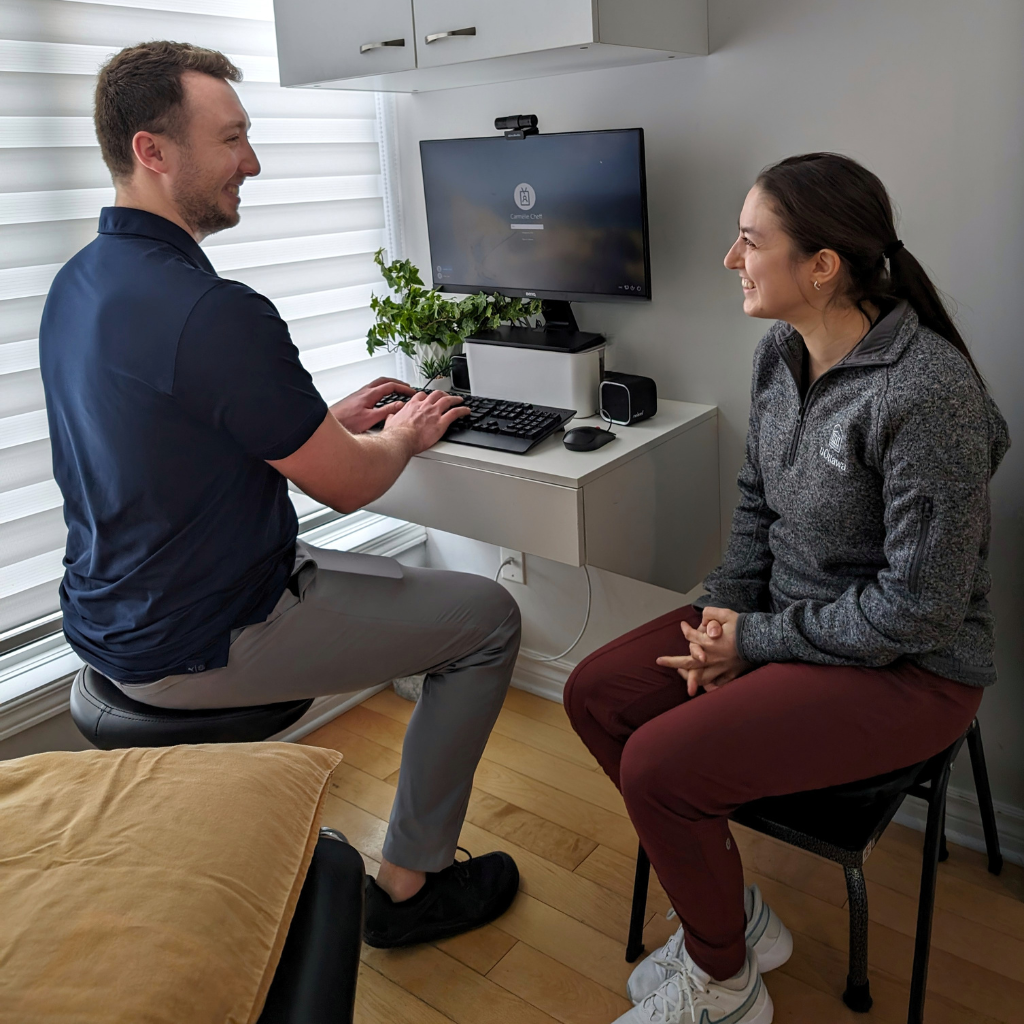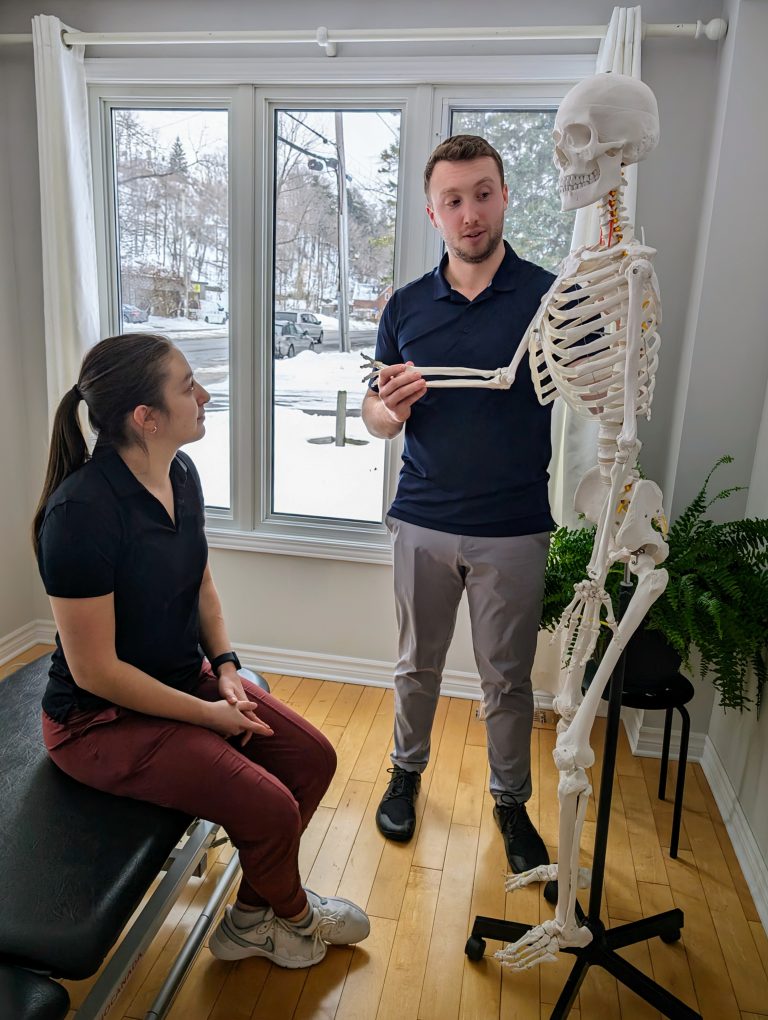Navigating your first appointment : What to expect
Are you looking to go into physiotherapy? Not sure what to expect ? Whether you have an injury, managing a chronic condition or seeking to improve your overall function, taking that first step into physiotherapy can feel a little intimidating. However, that is the first step towards a better physical well-being and quality of life.
What is physiotherapy ?
Physiotherapy, also referred to as physical therapy, includes health care professionals that focuses on helping individuals restore, maintain and maximize their physical function, movement and overall well-being. Physiotherapists are trained in assessing, diagnosing and treating a wide range of conditions affecting the human body (e.g., musculoskeletal, neurological and cardiovascular).
What to do to prepare for your first appointment :
- 1. Reason for consultation
Be ready to give information on what you’re coming in for and what happened.
Example : Explain your main concern (e.g., I am coming here since I have lower back pain). Add more details and be specific (e.g., specifically on my left side, when I go up and down the stairs or if I bend down). Try and remember when it first started, if it happened because of a specific event (e.g. after painting my walls last week) or it appeared gradually.
- 2. Medical history
Provide details about your medical history, including past injuries, surgeries and/or any other ongoing health issues (e.g., cardiac, pulmonary, gut or urinary).

- 3. Goals
Consider what you hope to achieve with physiotherapy, whether it’s reducing pain, improving mobility, strength, function, enhancing athletic performance or even quality of life, having clear goals can guide a physiotherapist for a better and more specific treatment plan for you.
- 4. Clothing
Wear loose and comfortable clothing that allows your physiotherapist to assess the areas needing attention (e.g. wearing shorts for having knee pain).
The initial Assessment
Your first physiotherapy session typically begins with an initial assessment that lasts one hour, where your physiotherapist will gather information to elaborate a treatment plan with you based on your specific needs.
- 1. Discussion
A detailed discussion will take place to understand your current condition, symptoms, and medical history. This conversation helps the physiotherapist have a better picture of your issues and any contributing factors.
- 2. Physical Examination
Expect a physical exam that may include assessing your posture, range of motion, strength, flexibility and functional movements. Your physiotherapist may also need to palpate different regions of your body to see how these regions are moving. This essentially means they will put their hands on different body structures such as muscles, ligaments or bones and see how they feel. This hands-on assessment helps identify areas of dysfunction to determinate the most appropriate treatment approach.
- 3. Treatment Plan
Following your assessment, you and your therapist will establish a personalized treatment plan depending on your goals. This will include :
- Education : Informed consent is primordial in physiotherapy, at any given time you have the right to remove any consent during treatment if you do not feel comfortable. Pain management is also another component that can be addressed, how to have an optimal movement pattern, sleeping posture, lifestyle modifications and more.
- Goal setting : Following your discussion and evaluation, you and your therapist will establish Specific, Measurable, Achievable, Relevant and Time-bound (SMART) goals for your rehabilitation.
- Treatment techniques : Depending on your condition, your treatment plan will incorporate a variety of techniques such as manual therapy, exercises, stretching, strengthening, posture corrections, gait training, modalities (ultrasound, dry needling, acupuncture, shockwave therapy).
- Home exercises program : To have an optimal recovery and progress in your physiotherapy journey, it is important to have exercises implemented in your routine. These will be established with your physiotherapist such as stretches, mobility or strengthening exercises or other. These will be performed at home and it will complement your in clinic sessions.
- Progress tracking : Throughout your treatment, your physiotherapist will regularly assess your progress, make adjustments to your treatment plan as needed and provide guidance to ensure you are both working towards your goals.

Explore Physio Cumberland: A Virtual Tour of Our Clinic and Assessment Process
In this quick tour video, we invite you to take a look around Physio Cumberland and get a feel for our clinic layout. You’ll see the welcoming reception area where you’ll check in, as well as our comfortable treatment rooms where your assessment will take place. We’ll also show you our well-equipped exercise area, where you’ll perform therapeutic exercises as part of your treatment plan. This video gives you a glimpse of the different parts of the assessment process and the inviting environment we’ve created to support your physiotherapy journey.
Note
Remember that rehabilitation takes time and dedication, so be patient with yourself and your physiotherapist and trust the process. Together, you’ll work towards your goals by promoting independence, function and your quality of life.
FAQ

Q : How long is an appointment in physiotherapy?
A : The initial assessment is typically an hour and follow-ups are thirty minutes.
Q : Do I need to have a medical reference from my family doctor before coming to physiotherapy?
A : No you do not need a referral from your family doctor to come in physiotherapy.
Q : If I have insurance, how does it work with billing?
A : At your first assessment bring all of your insurance information and all paperwork can be filled out at the clinic. We also offer direct billing with some insurances, you can inform yourself at your first appointment.
